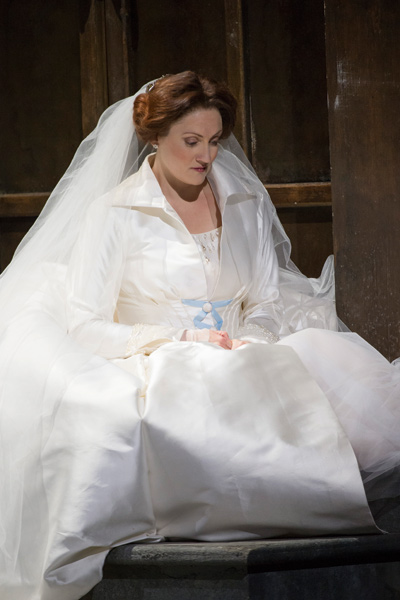In Act II of Lohengrin, after the villainess Ortrud has interrupted the procession to the Minster, and sown the seeds of doubt in Elsa’s mind about the provenance of her rescuer, Lohengrin himself appears and comforts Elsa, saying, ‘Come! Let your tears of sorrow become ones of joy.’ That is followed by a solemn quiet passage, only 11 bars long, and unrelated to anything we have heard before or will hear subsequently, but of such grave beauty that it makes you, too, cry.
This kind of pathos and nobility permeate Lohengrin, and though each of Wagner’s dramas has its own feel and colour, those of this opera are so wonderful that it’s impossible not to wish that Wagner had continued in the same vein for one more. That’s how I felt as Welsh National Opera’s new production of the opera drew to a close, for it is a magnificent achievement, even by this company’s exalted Wagnerian standards. Lothar Koenigs, the conductor, clearly loves every bar, and elicits from the orchestra, some of it excitingly located in various boxes in the theatre, and from the staggeringly fine chorus, performances one would be delighted to hear anywhere. Yet Koenigs is never inclined to dawdle, or highlight a phrase. I think this was, and certainly seemed, the swiftest Lohengrin I have ever heard, even the Prelude being taken at a less broad pace than usual. The tempi were a help to the singers, whose voices are on the small side for Wagner, but seemed suitable on this scale.
Emma Bell’s Elsa is the most radiant thing I have heard this lovely singer do, and her entry in her wedding dress for the procession in Act II was exquisitely moving, merely as acting. Peter Wedd is, in appearance, a surprisingly mature Lohengrin, but his authority, vocal and as a presence, made his portrayal as convincing as any I have seen. Susan Bickley hasn’t the big vocal guns that can make Ortrud’s outbursts so thrilling, but she projects with alarming conviction.
One of the most striking things about this production is that the Swan is not only not the usual embarrassment, but is extraordinarily beautiful and effective, as Gottfried brings the work, Wagner’s only unequivocal tragedy, to a uniquely convincing end. It’s a pity that the settings are so depressing, meaninglessly so, suggestive of an early 20th-century public lavatory; and the uniforms of the chorus, evocative of a similar period, add to the drabness of a work that should be in all ways radiant: that heightens the tragedy.
The evening before, I saw Jonathan Harvey’s Wagner Dream, ‘dedicated by the composer to the benefit of all beings’. All beings? I can think of many that that dedication would seem inappropriate for. This is a play-cum-opera, the play about Wagner’s last day. Jean-Claude Carrière’s text is cripplingly banal, and not well acted, so the context for Wagner’s imagining, as he dies, his unwritten opera The Victors is unpromising. Die Sieger is performed in Wales for the first time in Pali and Sanskrit, but with surtitles, no doubt to the pain of David Pountney, their enemy to the death. I couldn’t get much of a hold on this work, powerfully sung by fine artists such as Claire Booth, with instrumental and electronic accompaniment. It would have been, of course, preposterous for Harvey to try to compose a work in a post-Parsifal style; but since it’s meant to be by Wagner, the idea wouldn’t leave me, and the project does seem misconceived.
The Guildhall School of Music and Drama reached a new level of sophisticated achievement with a production of Britten’s penultimate opera, written for TV, Owen Wingrave. Unfortunately two things militated against its success: one was that the audience was seated either side of the stage, which occupied the middle ground, with the orchestra at one end; the other is that the work itself is so patently a fabricated and uninspired piece. As to the unwise positioning: it meant that the singers, all of them of remarkable quality (I saw the opening night, so the first team), had to rotate slowly, so that at any time some of the audience could hear what they were singing and some couldn’t — surely this was predictable, and had anyway undermined Rorem’s Our Town, accorded similar treatment last year.
This story of a brave and mocked pacifist going to his death in a haunted room is preposterous, and Britten should have had the taste to see that it is one of Henry James’s weakest mature stories. The pro-war Wingraves are a collection of crude caricatures; while Owen is noble, eloquent, young, handsome, courageous, and he sings such things as ‘In peace I have found my image [?], I have found myself…peace is not silent it is the voice of love’, so not surprisingly the music his creator awards him is emetic. I was placed near the orchestra, so could observe how the accompaniment is a brilliant series of tricks and tics, uninventive but attractive, with quite a lot of War Requiem leftovers. Benjamin Appl was superb as Owen, though, and I look forward keenly to seeing him in a decent role.






Comments